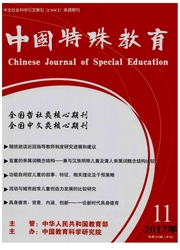

 中文摘要:
中文摘要:
自闭症领域内的已有理论均无法在统一的框架内为自闭症谱系症候群提供一种合理的解释,更难以开发出有效的干预措施。共情一系统化理论认为自闭症个体“原理”导向的思维决定了其共情能力缺损,而系统化能力无损甚至超常,这导致其产生社会认知障碍与非社会性特征(刻板行为、同一性需求、变化阻抗与能力孤岛等)。这种设想整合了已有理论的优势并弥补了其不足。依据共情与系统化之间的代偿关系,已有研究者开发出“运输机”卡通电影来帮助自闭症个体利用较强的系统化能力改善其共情缺损。未来,共情一系统化理论还需要进一步验证其假设的合理性。
 英文摘要:
英文摘要:
The existing autism-related theories can provide no reasonable explanation for the autism spectrum syndromes within a unified framework, or effective interventions. According to the Empathizing-Systemizing (E- S) theory, the "Truth"-oriented thinking style leads to deficits in empathy, as well as intact or even superior skills in systemizing. This causes social cognition disorders and nonsocial features of autism (rigid behavior, identical needs, resistance to changes, and the "island" of abilities). This hypothesis integrates the existing the- oretical advantages and compensates for the shortcomings. According to the compensatory relationship between empathy and systemizing, researchers have developed a 3D animated series called "The Transporters" in order to help autistic individuals to use the strong systemizing to improve their deficits in empathy. However, more re- searches are needed to verify the hypothesis of the E-S theory.
 同期刊论文项目
同期刊论文项目
 同项目期刊论文
同项目期刊论文
 Activity-dependent neurorehabilitation beyond physical trainings: “mental exercise” through mirror n
Activity-dependent neurorehabilitation beyond physical trainings: “mental exercise” through mirror n Comparison of the effects of contralaterally controlled functional electrical stimulation and neurom
Comparison of the effects of contralaterally controlled functional electrical stimulation and neurom Left hemiparalexia of Chinese characters:Neglect dyslexia or disruption of pathway of visual word fo
Left hemiparalexia of Chinese characters:Neglect dyslexia or disruption of pathway of visual word fo Whole body vibration training improves walking performance of stroke patients with knee hyperextensi
Whole body vibration training improves walking performance of stroke patients with knee hyperextensi 期刊信息
期刊信息
